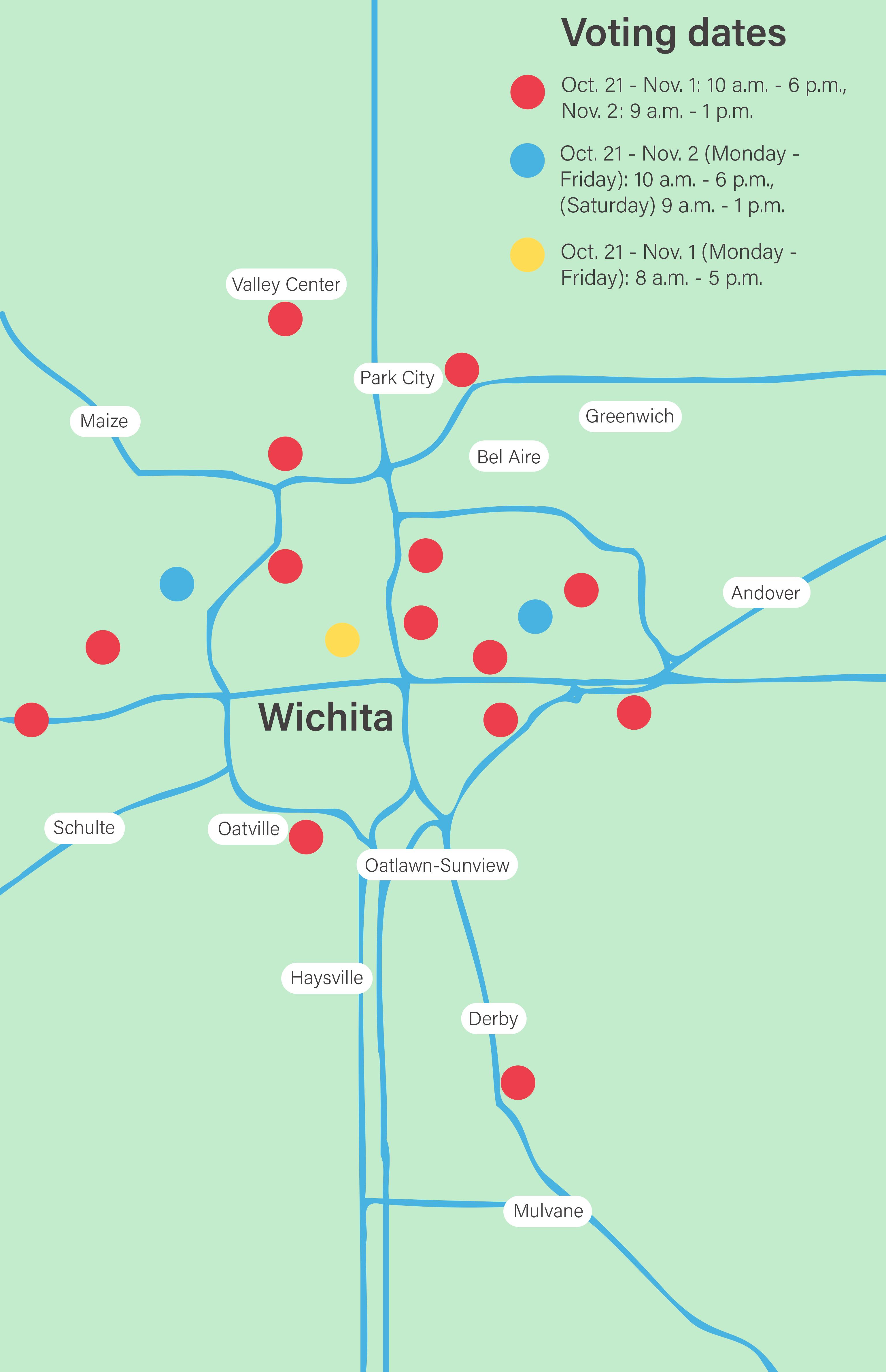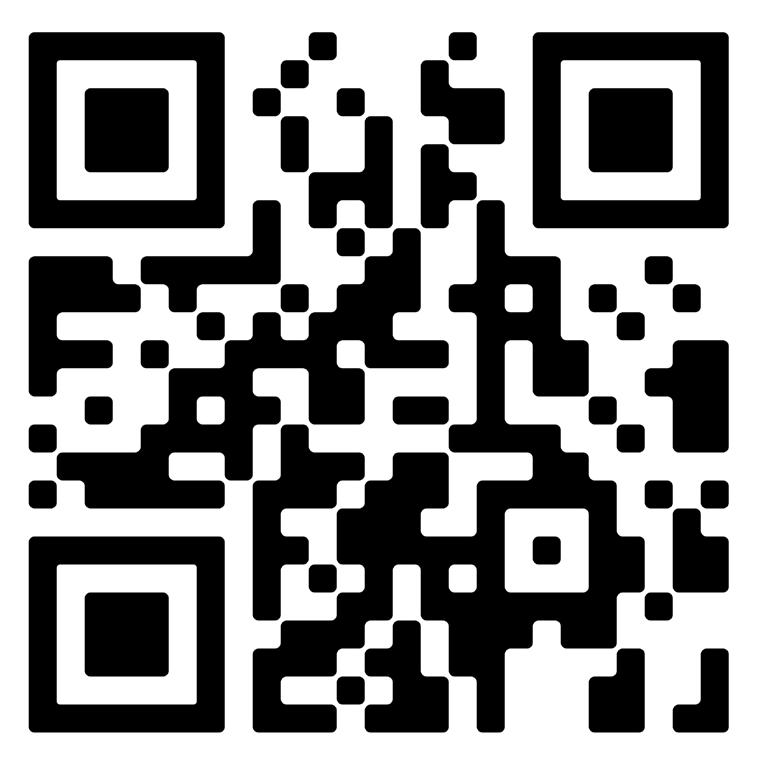










PAGE 3
What is the County Commission and what do they do?
Meet the candidates for Sedgwick County District 2, Jeff Blubaugh and Sarah Lopez.
Meet the candidates for Sedgwick County District 3, Stephanie Wise and Celeste Racette.
PAGE 4
Q&A with County Commission candidates.
• Q&A with State Board of Education candidates.
PAGE 5
• If you live on or around the WSU campus, meet who represents you in the Kansas Legislature.
Why this student chooses to work the polls each election.
PAGE 6
• What does the Wichita State political science department have to say about the upcoming election?
How to tell if the information you’re receiving is factual, and how to find more accurate information if it’s not.
PAGE 8 — OPINION
• Why you should be an election worker.
• In a bipartisan world, it’s okay to change your mind.
PAGE 9 —
• Does the two-party system unnecessarily constrict voters?
What a political consultant thinks we need to do to avoid political turmoil.
PAGE 10 — SPORTS
How the volleyball coach has made an impact over 25 years of coaching. Recapping volleyball’s loss against South Florida — and subsequent win against Florida Atlantic.
PAGE 11 —
Participants in workshop find community through felt figure making. Student gain typography insight from professionals at MIDPOINT workshop.
PAGE 12
Map of where to vote early.
MISSION
The Sunflower — both in print and online — will be a timely resource of information about the Wichita State University community. It will report on news, issues, activities, academics and athletics, in addition to offering a forum for discussion, reviews and commentary. It will also be an effective learning experience for students, who will have the final authority over what is published.
The Sunflower is a member of the Associated Collegiate Press, College Media Association and the Wichita Journalism Collaborative.
LEGAL One free copy of The Sunflower is available to members of the WSU community. Additional copies may be obtained from the newsroom, Elliott Hall 019. The Sunflower is private property and unlawful removal or use of papers is prosecutable. The Sunflower is funded by a combination of print and online advertisement sales and student fees allocated by the Student Government Association.
Copyright © 2024 The Sunflower. This newspaper, its design, photos and all contents are copyrighted.
Make a difference in the races that will impact you more. Spoiler alert: it’s not the presidential election.
With the presidential election nearly 20 days away, tensions are rising, campaigns are ramping up, and we, the voters, are likely growing nervous to see the results.
While the election between former President Donald Trump and Vice President Kamala Harris is on everyone’s mind, it’s crucial to remember the local elections that will likely impact Wichitans and students’ day-to-day lives more than the presidential race.
Kansans have seen firsthand how crucial local elections can be. Take the 2022 primary, when reproductive rights were on the ballot. The primary
District 16 extends through most of northeast Wichita from east of Hillside and K-96 and north of 127th Street and U.S. 54.
District 25 extends from most of central Wichita to as far south as the K-15 and I-135 interchange to as far north as the 21st Street and I-235 interchange.
District 29 includes the Wichita State neighborhood and extends from as far north as the K-96 and I-235 interchange and as far south as Harry and Hillside.
District 30 extends through most of southeast Wichita from south of 13th Street and K-96 through just west of Eastborough.
District 31 covers most of north Wichita from north of the Zoo Blvd. and I-235 interchange to as far north as Kechi, Kansas.
race, which typically has pitiful voter turnout, saw nearly 50% of eligible voters visit the polls. Kansans voted to protect reproductive rights.
People saw the importance of local elections then. So this election cycle — with a few County Commission and State Board of Education seats up for grabs, along with the entire Kansas State Legislature — we’re hoping voters see the same importance of local elections as they did two years ago.
Having everyone’s interests represented in local elections starts with encouraging young people to vote. For decades, it’s been clear that students and young people often fail to exercise
District 83 extends through most of south and central Wichita as far south as the Pawnee and I-135 interchange and as far north as 13th and Oliver.
District 84 covers most of central Wichita from as far south as U.S. 54 and as far north as 21st Street and Hillside.
District 85 extends through most of northeast Wichita as far west as Woodlawn and 29th and as far south as 21st and Rock.
District 87 extends through most of east Wichita as far west as 21st and Woodlawn and as far east as 21st and 127th.
District 89 includes most of central to northeast Wichita, including WSU. This district extends as far south as 13th and Oliver to as far north as Oliver and 53rd Street.

EDITOR IN CHIEF Allison Campbell editor@thesunflower.com
MANAGING EDITOR Mia Hennen
The Sunflower, founded in 1896, is the student-run newspaper covering Wichita State University. The print edition is published Thursday during the fall and spring semesters. The staff publishes daily online at www.thesunflower.com. For a complete staff list, go to www.thesunflower.com.
SPORTS EDITOR Jacob Unruh sports@thesunflower.com
ASSISTANT
their right to vote.
That’s why The Sunflower is compiling this voter guide: to inform voters, like Wichita State students, about crucial races, whether they concern local politicians who make decisions about their education or create legislation in Congress.
In the following pages, our news publication has curated information on political candidates, polling locations and more to act as a guide for voters.
So take a look inside, read up on the information you need, and be prepared to vote by Nov. 5.
District 1 extends from eastern Wichita through the east border of Sedgwick County.
District 2 extends from south-central Wichita through south-central Sedgwick Country.
District 3 extends from west-central Wichita through western Sedgwick County.
District 4 extends from north-central Wichita through north-central Sedgwick County.
District 5 extends from southeast Wichita through southeast Sedgwick County.
District 8 extends from Wichita through southeast Sedgwick County.
District 10 covers Harper, Sumner and Clay counties in Kansas.
CONTACT US 019 Elliott Hall 1845 N. Fairmount Ave. Campus Box 134 Wichita, KS 67260-0134
EDITORIAL Allison Campbell: 316-978-6906 editor@thesunflower.com
ADVERTISING Kiona Brown: 316-978-6905 admanager@thesunflower.com
FACULTY ADVISER Amy DeVault: 316-978-6052 amy.devault@wichita.edu
PHOTO EDITOR Garima Thapa photo@thesunflower.com
PODCAST PRODUCER Taliyah Winn podcast@thesunflower.com
ADVERTISING MANAGER Kiona Brown admanager@thesunflower.com
BY JACOB UNRUH sports@thesunflower.com
Voters in Sedgwick County’s 2nd Commission District will choose between two candidates with a combined 16 years of experience in local government in this election. The 2nd District includes south Wichita, Haysville and Clearwater.
Jeff Blubaugh, a Republican who served on the Goddard School Board from 2011-2013 and Wichita City Council from 20142023, is challenging Democratic incumbent Sarah Lopez, who has served on the commission since 2021.
SARAH LOPEZ
Lopez said she “didn’t grow up in a political home.” Her first foray into local government came after one of her daughters, who is gay and went to a Catholic school, faced homophobic comments from a teacher and principal.
One school day, after being told that she was “sick” and would “go to hell” if she didn’t “get help,” Lopez’ daughter locked herself in a bathroom.
“She was referred to conversion therapy and all these, you know, awful things,” Lopez said. “And so, (I) took her out of that school and put her in Wichita public schools and realized that their schools didn’t have an ordinance that protected LGBTQ students.”
Lopez helped advocate for the USD 259 school board and Wichita City Council’s non-discrimination ordinance to be updated to include LGBTQ+ protections. She said that advocacy opened her eyes to the impact of local government.
Lopez is the only woman, person of color and Democrat in the five-person County Commission. She said that background gives her a “completely different lived experience than my colleagues.”
“I don’t think anything negative of my colleagues, but you can only know what you know, and you can only live the life that you’ve lived,” Lopez said. “And if you don’t have a better understanding of more people, then how do you really represent them well?”
JEFF BLUBAUGH
Blubaugh was born and raised on a farm in Harper County and got a job at Cessna out of high school, where he worked his way up from the shop floor to the marketing team — while attending Friends University at night.
In the late 2000s, he transitioned to working in real estate. One day, he told his wife that he wanted to “do more in the community.” He began coaching junior football in Goddard, which led to a run on the school board and, eventually, Wichita City Council.
“It’s kind of one of those deals, you know, you get into something, and then you just want to continue to serve,” he said.
Blubaugh said his background in aviation and real estate fits the district.
“I’ve worked in aviation for 17 years,” he said. “I know the ins and outs of an airplane. I know the ins and outs of manufacturing. (As a) real estate broker, I understand the property values of the area.”
Blubaugh called himself a “big data person.” He keeps a customer database to track calls from constituents and checks in later to see if the problem was fixed.
“I work for my constituents,” he said. “I mean, if you have something, you have a need. I’m going to push for you, and I’m going to fight for you … I don’t care if you’re the lowest-income person in the city or the highest-income person in the city. I want to give everybody VIP service.”
Read the rest at thesunflower.com
The commission is responsible for approving the county’s annual budget and deciding how funds are distributed between public services and projects.
They are also influential in fostering economic development within the county, collaborating with organizations, businesses and government services to attract new businesses and promote job creation.
The commission supports emergency services across the county, especially in rural areas.
The Sedgwick County Sheriff’s Department, which is funded by the commission, provides support to other local law enforcement agencies, like the Wichita Police Department.
Rural EMS and fire services receive assistance in the form of funding, training and resources from the commission, ensuring emergency services are able to respond to emergencies in remote places.
The county also operates many social services, such as housing aid, mental health services and assistance for vulnerable populations in need.
The commission funds the County Health Department and offers immunizations, health education, disease surveillance and screening to county residents.
The department also operates community wellness initiatives, promoting a variety of physical fitness and nutrition education programs.
The county is responsible for maintaining and improving country roads and bridges and allocating funds to different infrastructure projects that address the needs of inhabitants and commuters.
It also establishes zoning laws that influence how land is used and developed.
— CASE BROWN caseb491214@gmail.com

BY AINSLEY SMYTH news@thesunflower.com
If you’re registered to vote in Cheney, Goddard or the central part of Wichita, there’s a good chance you’re in Sedgwick County’s 3rd District.
Voters residing in District 3 will get a chance to elect a new County Commissioner in November, a position that, among other things, makes decisions about how to spend county money and how to tax people in the county.
After the primaries in August, two candidates remain for the general election in November: Republican Stephanie Wise and Democrat Celeste Racette. The incumbent, David Dennis, a Republican, has been in office since 2016 and is not running.
Wise is a Wichita-based real estate broker who supports limiting the role of county government, lowering property taxes, protecting “individual property rights” and supporting services like first responders.
Wise grew up in Goddard. She attended Friends University and Butler Community College.
Wise said she and her high school sweetheart-turned-husband briefly moved to Arizona but came back to be close to family.
“I just knew really quickly that my family that I have here and the people that I have here was who I wanted to raise kids with,” she said.
Wise managed residential properties before moving to commercial real estate where she said she loved the opportunity to help small businesses.
“You’re a part of a very vulnerable time of people’s lives where they’re either starting a business and they have a lot that they’re going through emotionally and then financially, and so you’re a part of really big steps

for companies,” Wise said. “It’s really, really fun to work with small businesses and just be a part of that story.”
Wise, who’s never been in public office before, said she sees the role of county government in her real estate business.
“I’m a small business owner, so I know the importance of local government’s role in my business and the businesses of the people that I work with,” she said.
City and county governments make decisions about zoning and property taxes, issues that affect commercial real estate.
“So contract negotiation, you know, from a local government standpoint, it affects our day-today,” Wise said. “And so just as a mom and a wife and a business owner here, I know it’s important for us to get involved in our local leadership.”
Despite running for office, Wise is keeping her job, but said she’ll scale down her involvement in her business, allowing someone else to take over her day-to-day role.
“I have no intention of being a career politician,” she said. “This isn’t me applying for a new job, and I like that in a candidate. So that’s what attracted me towards it; I want more people that are bought in, you know, invested here, to lead with a servant’s heart rather than an agenda.”
Celeste Racette is a former auditor running on a platform to “eliminate wasteful spending” in the county budget.
A Wichita native, Racette received a bachelor’s degree in accounting from the University of Kansas, a master’s in business administration from Wichita State and a Credit Union National Association management degree from the University of Wisconsin. Read the rest at thesunflower.com
The Sunflower sent questions to local political candidates around Sedgwick County. Answers have been edited for length and clarity. Full responses and responses from Kansas Senate and House of Representatives candidates can be found at thesunflower.com.

What will be your top one to two priorities if elected to office?
Providing stable funding and attracting/retaining qualified teachers and staff are two key priorities. Both require strong advocacy from the Board to promote the importance and value of public education. While the Legislature appropriates the funds, there is an important role for the Board in advocating for stable funding. The current funding formula finally meets the minimum required by the state constitution, but it will expire in 2027.
I support extending the formula to provide stability to school districts. In addition, I strongly oppose vouchers and other efforts to divert public funds from public schools.
What will you do for Wichita State University students? What’s at stake for students in this election?
The future of public education is at stake in this election. I am a strong advocate for public education and stable funding for our schools. My opponent favors vouchers which would drain hundreds of millions out of public school budgets (without any reduction in the number of students). This would lead to consolidation, school closures, increased class sizes and increased taxes. A strong system of public education strengthens communities, makes Kansas more attractive to businesses, and creates economic opportunities for all WSU students as they move from graduation into the workforce.
Wichita has closed several elementary schools this year; what are your thoughts on preserving preexisting buildings versus building new facilities from the ground up?
Closing schools is very difficult, but it is a reality for many school districts in the area and it not likely to go away as a concern (due to population declines). This is one area where local school boards play a vital role in terms of planning and
budgeting. They can anticipate what is best for their community and what is best for their students. There is no one-sizefits-all solution. For some, new buildings might be preferable as the best solution to serve the needs of their students.
What should Kansas school policies be on phones in classrooms?
The Board established a task force to provide recommendations on the use of personal devices in school, as well as screen time and mental health. The recommendations will be out this fall. This will be valuable information for local school districts to use as they formulate their own policies.
How do you keep teachers in Kansas and recruit new ones?
The shortage of teachers (and other key staff) is a serious problem. It is no surprise that we have a shortage given the false and misleading accusations that regularly are made against teachers. I served for more than 8 years on the Board in Maize where I saw first-hand the hard work and dedication of our teachers and staff ... We need to restore public support for the profession to encourage recruiting and retention of teachers and staff.

What will be your top one to two priorities if elected to office?
Although school safety doesn’t come directly under the control of the State Board of Education, it ranks quite high on my list. Students, teachers and parents should not have to contend with gun violence or bullying. Additionally, it is time to rethink the model we use for classrooms.
What will you do for Wichita State University students? What’s at stake for students in this election?
Post secondary, by State Constitution, falls under the control of the Board of Regents and not the State Board of Education. Public education is at stake in this election. To continue
underfunding public education will ultimately lead to the end of its existence.
Wichita has closed several elementary schools this year; what are your thoughts on preserving preexisting buildings versus building new facilities from the ground up?
The closing of schools falls under the local Board of Education just as the decision of what to do with the vacated buildings. The state has no control over their decision.
What should Kansas school policies be on phones in classrooms?
Trying to find the perfect balance of technology is challenging, but my belief is that anything that interferes with learning or is a distraction to learning has no place in the classroom.
How do you keep teachers in Kansas and recruit new ones?
Compensation is certainly a factor in addition to the increased workload being handed to them; safety is also a major consideration. We must address the negative factors in a meaningful way to keep teachers and attract future teachers.
questions.
What will be your top one to two priorities if elected to office?
With mental health services in Kansas ranked last nationally, I took a leading role in bringing a desperately needed Regional Mental Health Hospital to Wichita. We break ground next year, but the need is great and our work will continue. It can’t be business as usual in government and provide significant, sustainable tax
What
percent chance
relief. Functional consolidation of county and city services will eliminate duplication, modernize and streamline processes and reduce costs while also improving the quality of public safety and infrastructure services we count on. Consolidation also simplifies customer service, no more figuring out who to call with an issue.
What will you prioritize to protect in the budget? What do you think can be cut?
When I came into office, the county faced a serious staffing shortage (65% staffing across the board) negatively impacting services. I know county services are only as good as the people who provide them, so I’ve raised pay and improved benefits for all county employees, raising staffing levels to 90% today.
I expect efficiency and financial accountability, and I’ve cut the mill levy property tax rate the
to get your value reduced. An appraisal is an opinion and it is not statistically possible for the County Appraiser to know the exact condition, use and life of a property 99% of the time with such a broad appraisal process which is determined by a pretty small sample size of real estate activity. County Commissioners approved a $563 million budget for next year, a 6% increase in spending over the current budget. They did lower the mil levy by about one-third of a mill but to give you context that’s $4.14 a year on a $100,000 home. Total spending is still UP 6% including a 3% pay raise for County Commissioners making over $100,000 a year already. We need real property tax relief as the current mil levy reduction doesn’t even cover the cost of a scooter coffee or a couple gallons of gas.
What will you prioritize to protect in the budget? What do you think can be cut?
Public safety needs to continue
last two years to the lowest rate in 30 years. We have a financially responsible budget and no cuts are necessary. Our financial discipline has earned Sedgwick County a rare AAA credit rating.
What will you do for Wichita State University students? What’s at stake for students in this election?
Responsible, forward-looking local government is at stake. I’m a young healthcare IT professional with experience finding innovative solutions for complex problems that come in under budget and on deadline. I believe in people over politics and work hard to make this community better than I found it. I’ve already improved public safety/ infrastructure services, cut the property tax rate twice and made smart investments to enhance our quality of life.
In contrast, my opponent denied south Wichita expanded transportation options because
to be at the top of the list in protecting the budget. Before I look at additional cuts I want to research more collaborative opportunities with the City of Wichita as well as the other 19 cities in Sedgwick County. There are too many duplications between the cites in the County and Sedgwick County Government. We need practice more lean management of Government operations.
What will you do for Wichita State University students? What’s at stake for students in this election?
Wichita State University has been one of the largest benefactors of Local, State and Federal monies to increase educational opportunities in the area. I was on the Wichita City Council when we worked with WSU on the innovation campus, the Law Enforcement training center as well as the Bio Med center downtown. As these projects continue to come to fruition and
he “didn’t see the need” and left Wichita a $55 million budget deficit and unavoidable cuts to public safety. Unacceptable.
What can you do to make housing more affordable for college students?
I will continue Sedgwick County’s financial support for WSU with millions annually for scholarships to local students. We’re also investing in significant infrastructure work to help keep property insurance costs down and we’ve cut the property tax rate two years in a row (both expenses included in local rents).
Sedgwick County is also encouraging development of starter homes and other affordable housing options within Wichita through tax incentives for projects meeting certain criteria. I support new housing development in town where there’s already infrastructure to make more options available to
growth students will continue to reap the educational benefits. I am proud to say my nephew moved here from Newburg, Oregeon to attend WSU this Fall.
What can you do to make housing more affordable for college students?
High interest rates and low supply have created a bottleneck in affordable housing. People aren’t leaving their current homes to upgrade because they can’t buy as much house in this market, so affordable housing isn’t coming onto the market. Cost inflation and supply have created an environment where building new affordable housing is also challenged and many of the new housing or duplex projects are coming to the market with $1,500+ rents which are not affordable. There are opportunities to free up development by using some of the tools that already exist. RHID needs adjustment but could be a tool for infill projects if used
students and families seeking affordable housing.
How can the County Commission keep people in Sedgwick County?
Functional consolidation is an innovative way to improve the vital safety and infrastructure services we count on while also making significant, sustainable tax relief possible. I have a proven track record of financial responsibility, cutting taxes and improving public services, and I have the professional experience to continue modernizing local government. We should also make more smart investments in qualityof-life amenities. For example, I serve on the Exploration Place committee building the new EP2 Riverfront regional attraction that’ll increase annual attendance from 400,000 to 1 million, economic impact from $22 million to $66 million, and create hundreds of new jobs.
properly. The market needs to be freed up as much as possible in order to meet needs organically. Density is the best way to meet the need quickly. Local banks and creative funding pools have been discussed to give investors opportunities with developers to create more housing.
How can the County Commission keep people in Sedgwick County?
We need to ensure we keep Sedgwick County an affordable place to call home. Our value proposition here in Wichita and Sedgwick County is you can get to pretty much get anywhere in town in 20 minutes, still a small town feel where we know our neighbors and we continue to be one of the cheapest places to live in the Country. We need to ensure our sustainability and growth by making sure we keep the cost of living as low as possible while working toward quality of life projects as the economic climate permits opportunities.
*Stephanie Wise and Celeste Racette did not respond to The Sunflower’s questions.
‘Develop
how to vet information during this election
BY BAYLOR HENRY & SHELBY DUVALL
As Election Day approaches, many voters are conducting research to help choose which candidates to vote for. Some may find it difficult to ensure their information comes from a credible source, especially with the rise of artificial intelligence.
To examine the facts behind the statements, students and young voters should understand why politicians might try to contact them in the first place.
“Historically, we have very low voter turnout for people under the age of 25,” Logan Byrd, advocacy manager at Loud Light, said.
Loud Light is a Kansas-oriented voter’s rights organization based out of Topeka.
In a study conducted by Tufts University in 2022, only 21.4% of Kansas voters aged 18 to 29 turned out to vote. While these numbers have been on the rise, they still pale to neighboring state Colorado’s 33.1%.
If you’re a registered voter trying to decide which candidates to vote for, some quick Google searches will bring up dozens of articles to skim through. But not all of this information might be true or representative of the issues at stake.
Part of being a responsible voter is understanding and verifying all the information in front of you, according to Tom Shine.
Shine is the director of News and Public Affairs at KMUW, Wichita’s public radio station. Shine also serves as an adjunct instructor in the Elliott School of Communication at Wichita State.
“The key is diversity in media,” Shine said. “If you look at a variety of sources, you’ll soon find out who writes and reports in the best manner. You’ll find who reports in a neutral and unbiased way, who doesn’t use loaded language.”
Shine said that “people tend to follow the news outlets that reinforce their beliefs.”
According to a study done by Pew Research Center, voters who consistently support conservatives tend to be highly clustered around a single news source and are more likely to have friends that share their beliefs.
Voters who support liberals are more likely to get news from an array of sources but are also more likely to curate their social media feeds and unfollow accounts based on their political views.
To counter this, Shine suggested a few outlets he thinks keep stories objective.
“One (organization) that keeps

things straightforward is the Associated Press,” Shine said. “So does the BBC, believe it or not.”
Resources like the Media Bias/ Fact Check website can help identify which organizations might show bias. While this doesn’t necessarily mean that sources with bias don’t share accurate information, it might reflect on which stories are covered, and how they are covered.
According to James Ian Tennant, if voters choose to go through more “biased” sources, it’s important to stay open-minded to new ideas.
“I think it’s just incumbent upon us to just kind of be more mindful of what’s out there,” said Tennant, an assistant communications professor and former journalist. “We’re too much stuck in our silos.”
Wichita State students can access paywall-blocked news content, including articles from The New York Times and The Washington Post, through the InfoTrac Newsstand database.
A Wichita Public Library card also provides access to historical databases and newspapers, including the The Wichita Eagle.
As election season approaches, political topics can make their way more into everyday conversation. When discussing complicated topics, Shine said it’s important to examine information other people
are saying.
“My response is usually, ‘Is that true?’” Shine said. “Make them explain how it’s true … ‘Where did you hear that or read that?’ And I’d like to know so I can go and maybe read that myself.”
Being open to new or different ideas is also key to having productive conversations on politics, Shine said.
“Not wanting to talk about or not being willing to listen to another viewpoint is wrong,” Shine said. “You don’t have to agree with it, but it’s another viewpoint you should at least think about, and if you’ve considered it and done some research and don’t agree with it, that’s fine.”
Rachel Crane, a librarian at WSU, said it’s important to question the sources of information.
“It doesn’t mean become paranoid,” Crane said. “It just means, you know, anytime you hear about some event or happening or what someone reports statistically, you have to wonder, ‘Well, where do they get their sources?’”
Checking out the domain of a website and looking for grammar or spelling mistakes can help validate a news source. Individuals can also see if other news sources are reporting on the same issue.
“I think people always have to be circumspect,” Crane said. “You
just can’t assume that everything is as you hear it.”
One of the best ways to combat fake news, Crane said, is to talk to a local librarian.
Wichita State’s University Libraries has a fact-checking guide called “fake news” with verified fact-checking websites for students to use.
One of these is the CAARP test, a list of questions that help determine the reliability of a news source. While it is not a fool-proof method, the method makes people ask about currency, authority, accuracy, relevance and purpose.
This test can be a valuable tool due to the influx of sources available to voters.
“It’s a fire hose of information … We just have to learn how to pick and choose,” Tennant said. “People develop their own bullshit meter: is this passing the test or not?”
Accountability is another reason for fact-checking, and it’s not just about politicians.
“Before you vote for a candidate, you want to make sure that what they’re saying on key issues lines up with what you believe in,” Shine said. “And that they’re not just saying that to get your vote.”
Shine said it’s also important to verify the claims of local candidates, such as those running for state, city and school board offices.
“Those people affect your lives a lot more than the president does,” Shine said.
Voters can check this by looking at politician debates, interviews and rallies, as well as news stories.
“You’ll be able to find out — based on past comments they’ve made — past votes they’ve made, past legislation they’ve introduced, you’ll know where they stand on stuff,” Shine said. “But you’re not going to get that on their little mailer. You’re going to have to do some research.”
- Words aren’t the only information that require fact-checking. In a world with evolving technology, AI is also becoming a concern in questioning the validity of photos and videos.
- Many of the same practices that can help sort through news apply to AI, too, said Tom Shine, director of News and Public Affairs at KMUW.
- “If you see (a photo) on some random site, go look for it somewhere else,” Shine said. “Sometimes people rerun photos from years ago and alter them slightly.”
- At times, all it can take to be informed is a quick reverse image search through Google. To do this, visit Google.com and look for the camera icon attached to the middle-of-the-page search bar.
BY SOPHIA BEST sophiadapbest@gmail.com
Alexandra Middlewood said there has never been a presidential election race like 2024.
“We have no examples of something like this that has happened in modern times,” said Middlewood about President Joe Biden dropping out of the presidential race in July. “It’s certainly going to be an interesting year.”
Middlewood is an associate professor and the chair of the political science department at Wichita State. She said Biden dropping out just 100 days before the election has led to learning opportunities for the political science department, especially when looking at Kansas voting data.
Middlewood and associate political science professor Brian Amos have been managing the IKE Lab since February. The website compounds data on Kansas elections and voters.
As of August 2024, IKE Lab
has reported that there are 1,997,408 registered voters in Kansas. The majority, at 44.8%, are Republicans, while Democrats make up 25.7%.
IKE also collected results from the March 19 presidential primary, noting that former President Donald Trump led all candidates at 72,115 votes, far surpassing the second-highest-voted candidate, Joe Biden, who had 35,906 votes. Republicans in Kansas also had a 2.4% lead turnout over Democrats in Kansas.
Political science student Kian Williams noted an uptick in younger voters registering.
According to PBS, Vice President Kamala Harris’ campaign has heavily attracted young voters through its youthcentric online campaigning, while Trump’s campaign has focused on the traditionally larger group of older voters.
“Once Kamala Harris got in, got the nomination, it was pretty business as usual,” said Williams, who is also an IKE Lab and political science research assistant.
Despite the late introduction, and the appeal to younger voters, Harris has kept even ground with Trump in the polls. Previous polls between Trump and Biden gave the former president a greater edge over the current president.
The election is likely to follow the pattern set in 2020, with a higher turnout of young voters, according to a political research center at Tufts University. Firsttime and repeat young voters have been registering at a record rate.
“We did see, I believe, under30 voters break 50% turnout in 2020 for the first time again, and possibly ever,” Amos said “But I imagine it will be higher.”
While Kansas has maintained its status as a red state since 1964, nationwide, new, young voters have been voting primarily for Democrats.
“I think young voters should know that they do have influence in these elections,” Williams said. “The act of voting is, in itself, one of the most American, one of the most patriotic things that you can do.”



Being an election worker is, unfortunately, a thankless job. You should do it anyway.

On Tuesday, Nov. 5, I’m going to wake up at 5 a.m., drive to a small town in Reno County and stay there until after it becomes dark outside, helping process the votes of people who I almost certainly disagree with on every political issue.
And you should, too.
Since before I was old enough to vote, I’ve served as an election worker for everything from national elections to small odd-year primaries. Doing so is extremely important — not just to

For a long time, I felt like I wasn’t doing politics “right” because I didn’t fit neatly into one party. But here’s the truth: It’s perfectly okay to land in the middle. In fact, rarely do people find their beliefs fully aligning with one political party.
As college students, it’s common to rethink political beliefs. What mattered as a freshman might shift by graduation.
Wichita State students, like many young adults, are stepping into the adult world where issues like taxes, housing and health care take on new significance. Just as life isn’t static, neither is politics.
I grew up with conservative parents, absorbing their views. As I ventured out on my own, though, my exposure to different people and perspectives challenged those beliefs.
Over time, I moved from a Republican-leaning teen to an independent mindset, evaluating each candidate and issue based on what made sense at the time.
Depending on what’s happening locally or nationally, as well as what the candidates are advocating for, I can lean in whatever way aligns with my ideals for the time period.
This can feel uncomfortable, especially when faced with polarizing conversations or family debates. The holidays are coming
preserve democracy, but to insulate yourself from misinformation about it as well.
Election workers have been in the headlines since the 2020 election for receiving death threats and enhanced security measures to protect them against potential violence from people who believe they’re an aspect of a rigged system.
These threats have been mostly contained to swing states that have seen the most allegations of voter fraud. Being constantly under threat from a lunatic waving a gun is actually far more eventful than the benign reality of what working the polls in Kansas is actually like.
In my experience, it’s a repetitive exercise of sitting in a small
town community center for 12 hours, greeting and checking in voters as they trickle in and out of the door. It’s chatting with the elderly couple you’re sharing the job with during down periods and slowly realizing that they know literally everyone who comes through the doors to vote while you’re an outsider.
But all of that’s okay because it’s gratifying to know you’ve played a small, but important role in the process of democracy. And given the threats seen to our democracy over the past half-decade, we know that process can be fleeting.
Either you preserve and defend it, or you lose it.
By participating in the democratic process, you insulate
yourself from unwarranted attacks on it. I’ve worked with numerous conservative people throughout my time as an election worker, but none of them have bought into the common refrain that American elections are, or can be, rigged. When you become a poll worker, you realize that Dominion voting machines — which are used in Kansas — are simple tools that make the counting process far simpler and can easily be verified, not Venezuelan devices that switch votes away from Trump. You realize that it would be impossible to commit mail-in ballot fraud at a large scale because we can see if people have already submitted or received a mail ballot before we give them an in-person
one and can tie every ballot to individual people in the election database.
You realize that most election workers are public servants who do a boring, bureaucratic and thankless job for the sake of the country, not partisan Democrats who want to rig elections.
Nearly half of poll workers are over 60 years old. When I go to the required training workshop, I’m often the only young person in the room. That needs to change because those old folks won’t be around forever.
Become an election worker. The job, while thankless and a little boring, is crucial to keeping democracy on track.
Being independent or politically flexible is a valid option.
PIPER PINNETTI Opinion editor
around the corner fast, and there are major local and national elections occurring within the next couple of months.
One of the most important lessons I’ve learned is to vote for candidates whose values align most with mine, rather than sticking to a party label.
A Shocker might vote Republican or Democrat in one election and switch in the next, depending on who best represents their ideals at the time. Blindly voting based on party loyalty can lead to supporting someone whose platform doesn’t actually serve your needs or those of your community.
Beliefs, experiences and knowledge changes constantly and immeasurably. Priorities I have now can be different within a year, not necessarily exactly in four years.
It’s important to recognize that voting isn’t about loyalty to a political party.
It’s about considering the candidates and issues on the ballot and asking yourself who best represents your current values, priorities and the needs of your community.

It’s often assumed people have to choose a side, either left or right. Sometimes there is significant pressure applied by family, friends or the community to be on one side or the other.
But being independent or politically flexible is a valid option. Being in the middle allows someone to make more thoughtful decisions without being boxed into a party identity.
People are allowed to disagree with parts of both platforms, no matter what.
Political evolution doesn’t make someone indecisive; if anything, it makes them adaptable.
Political stances are often shaped by the environment you live in. If you move from one community to another, your priorities might shift, too.
While Wichita is struggling with certain community issues, a neighboring state may have cities that struggle with completely opposite situations.
A candidate a student voted for in their hometown might not suit the needs of their college town or new city.
For example, maybe they supported a liberal candidate in the city because the values aligned with a larger community.
But in a different setting, like a rural community, they might find themselves leaning toward a more conservative candidate who reflects the urban needs and challenges of that environment, Changing your mind or reassessing your views doesn’t mean you’re indecisive or uninformed — it means you’re growing. Politics are dynamic, just like us.
So, if you feel like your political beliefs are evolving, know that it’s not only okay, it’s a sign you’re paying attention and thinking critically. You don’t have to stick to one label for life; as issues arise and your life changes, so can your perspective.
The primary political parties of the United States — the Republican and Democratic Party — have ruined this country’s election system locally and nationally.
Even in 1796, George Washington’s farewell speech warned United States citizens of the follies of a two-party system.
“(Political parties) are likely, in the course of time and things, to become potent engines by which cunning, ambitious, and unprincipled men will be enabled to subvert the power of the people and to usurp for themselves the reins of government, destroying afterwards the very engines which have lifted them to unjust dominion,” he said.
We see his prediction unfolding today.
The two-party system creates much inconsistency in policies, from the national level all the way down to local politics.
Both parties want less crime, safer streets and overall, a higher quality of life. So why does it often
feel like the two-party system alienates each side to the point they can’t agree on any of this?
Economic policies between the two parties differ greatly.
Democrats are in favor of providing more relief for middleand low-income households, stating that it creates more economic growth because middleand low-income households are more likely to spend money.
Republicans primarily provide more relief for businesses and investors, stating that the more money companies have, the more demand for jobs there will be, providing economic growth.
Under Democratic or Republican leadership, at least one part of the social-class scale won’t reap the benefits of a sound economy. This doesn’t make sense, since economic policies are flexible and can be adapted to benefit everybody.
The two parties also stifle debates for people whose beliefs don’t perfectly align with one singular party’s beliefs.
Republicans are more often than not, pro-Second Amendment, whereas Democrats want stricter gun ownership policies. Conversely, Democrats are in favor of abortion and
other female reproductive rights, and Republicans tend to push for abortion restrictions and keep female reproductive rights hush-hush.
Both of these issues concern personal freedoms, but both parties have vastly different interpretations of what personal freedoms are.
What happens to those who are pro-choice and pro-Second Amendment, or vice-versa?
These people don’t have much standing ground because their beliefs aren’t perfectly aligned with one party, forcing them to choose between one side of the political spectrum or the other. There needs to be more options for those whose beliefs don’t fall under a specific umbrella so that voters can truly vote for the candidate that best fits them.
It’s inconsistencies like these, especially when two parties are at the forefront of elections, that hurt the people the parties govern.
Alienation of certain candidates is more common when two parties dominate politics.
Kansas has had only one governor who wasn’t a Republican or Democrat. Former Gov. John Whitnah Leedy served from 1897-99 and was a member of the
Populist party, a third party that was dissolved in 1909. The 47 other governors of Kansas have all been a Republican or Democrat.
The bottom line is that third parties are underrepresented, creating a massive divide between candidates and their target audience when they’re forced to conform to a different party or abstain from the democratic process altogether.
Wichita has taken measures to help with the problem of alienation.
During city council and mayoral elections, the candidates’ party is not listed on ballot sheets ,and each election is nonpartisan.
This means that the citizens in Wichita will have to be more aware of the values and policies the council members and mayors want to run the city by, creating more informed voters and preventing people from mindlessly voting on a party line.
The more informed voters a city has, the more you’d assume the best candidate gets elected. The same goes for the country.
But until national and local elections do away with the primary two parties, George Washington will continue to roll in his grave.

The general election is rapidly approaching, and it can be hard to determine who to vote for, especially when local candidates seem unknown.
There are some websites that are available for basic research: Ballotpedia, BallotReady, VOTE411 and state government websites.
These resources are useful for gaining basic information about political candidates, like party affiliation, what offices they’ve held and the topics they’re running on. There is a bottomless pit of information that can be useful when deciding what candidate to vote for, like if a candidate has a criminal record. It could also cover what type of organizations back candidates and if they are receiving funding from these groups. This information may seem unimportant, but having it on hand can be helpful when making a hard decision between what seems like the lesser of two evils. It’s important to know where the money is coming from, especially if candidates aren’t advertising their supporters. It’s also helpful if candidates are claiming that
Political consultant calls on new voters to avoid ‘grim reality’ of 2016

Eight years ago, I was a freshman on campus at Wichita State. It was the first presidential election in which I could vote, and I remember the feeling of relief that so many of us were on the cusp of embracing as the dust settled on the 2016 election. Donald Trump’s scary — and quite weird — audition in political theater would be over, the U.S. would elect its first woman president and politics would return to some sense of normalcy.
Of course, the exact opposite ultimately happened.
Although politics had been my passion since a young child, when I first came to WSU, I planned on pursuing education or academia instead of politics. After grappling with the reality of what happened that November, I eventually changed my mind and volunteered for Democratic campaigns, which led to my career in Kansas politics.
In the months and years after that November, so many engaged Kansans asked themselves what they could do to make their voices heard — and make a difference.
The level of political activity on and around campus in 2017 and 2018 far surpassed what I had seen prior. Whether it be voter registration drives or students volunteering for campaigns, Shockers were energized. There was a collective feeling of urgency post-2016, and it led to real change in the coming election cycles, both in Wichita and Kansas.
In 2022, we saw a similar wave of enthusiasm in Kansas with the overturn of Roe v. Wade and the Aug. 2 constitutional amendment thereafter. Due to that historic level of enthusiasm, activism and support, the amendment was defeated with almost 60% of the vote.

the money is going to go toward a certain charity or good cause.
Most of this information can be found on the Federal Election Commission website, which has all the information in public records.
Information that can be obtained through this website is extremely helpful when looking at individual contributions, basic candidate information, Political Action Committees (PACs), commission activity and campaign finance statistics.
Each link takes viewers to other places where readers can find more information about what
in particular they are looking for.
Personally, when I research candidates, I use the VOTE411 website for basic information, then expand my searches through Google.
VOTE411 has a great feature where candidates can answer questions about their campaigns. The only downside is that candidates don’t always answer the questions. When this happens, the site fills in the blanks, saying that the candidates have not responded.
Ballotpedia for basic searches has become another regular tool during my research. I often
compare the information I find on each of the websites to make sure that the information is legitimate before making my decisions.
It’s important to do your own research on candidates before you go to vote. Forming your own thoughts and opinions about candidates is essential to voting.
It’s better to formulate your own thoughts about candidates rather than listen to what others have to say about them.
If you make it to the polls, be sure to do your research beforehand to make sure you’re the most informed and effective voter you can be.
Eight years later, we find ourselves in a very similar situation to 2016 with an even closer race, and another chance to elect our first woman president. While Kansas will likely not be competitive this cycle on the electoral map, there are simple actions you can take, like phone banking for swing states or volunteering for campaigns at the state legislative and local levels.
Whether it be knocking on doors, making phone calls or just encouraging your friends and family to vote, small actions by many can make the decisive difference in the end.
I encourage everyone to ask themselves what they can do prior to Nov. 5 so that rather than face the same grim reality of 2016, we can move our state and our country forward.
Voter registration has gradually increased over the years according to the Kansas Secretary of State website. Additional information on voter registration can be found on bit.ly/4f7lzse.
TOTAL VOTER REGISTRATION IN KANSAS
2016 : 1,817,920 with 450,265
Democrats and 807,912
Republicans
2018 : 1,841,776 with 463,114
Democrats and 817,713
Republicans
• 2020 : 1,937,455 with 512,260
Democrats and 872,514
Republicans
2022 : 1,979,004 with 523,338
Democrats and 884,969
Republicans
2024 : 1,994,621 with 512,630
Democrats and 893,181
Republicans

BY JACOB UNRUH sports@thesunflower.com
When Chris Lamb was hired as Wichita State’s head volleyball coach, he told The Sunflower that he was focused on doing whatever possible to “help this team become better.”
Twenty-five years later, mission accomplished. Under Lamb’s leadership, the Wichita State volleyball program has transformed from a middling team that had never won its conference to a consistently contending powerhouse coming off its first national championship trophy.
“We just kept winning more and more every single year,” Lamb said. “I don’t know; (it’s) just me trying to recruit athletes and coach them up as volleyball players. I know it’s never changed.”
Known as “Lambo” by players and fans, the coach’s 25th anniversary at Wichita State was recognized at Charles Koch Arena on Friday. Thirty-three Shocker volleyball alumnae returned to profess Lamb’s impact on Wichita State’s volleyball program — and their own lives.
“He was a phenomenal coach,” said alumna Elizabeth Walker, formerly Elizabeth Meyers. “I am so happy I made the decision to come here.”
Lamb said when he played sports growing up, he always felt like the “IQ kid.”
“I just kind of was a rule
follower,” he said. “So (if) they (the coaches) say, ‘We’re doing this,’ I was doing that.”
Lamb said he played a lot of volleyball during open gym sessions at his high school on Monday nights.
“I would always decide, ‘Am I going to watch ‘Monday Night Football’ or go play volleyball?’” he said.
Coaches throughout his childhood told a young Lamb that he should become a coach himself. Lamb said he “kept getting recruited up the ladder.” Throughout the years, Lamb moved from high school volleyball coaching to being an assistant coach at California State University, Bakersfield, to assisting at the University of Arizona, to the WSU head coaching job.
“I just kind of just felt like a tumbleweed going where the wind was going to blow me,” he said.
Lamb said former WSU athletic director Jim Schaus “did everything right” in recruiting him to Wichita. The Wichita State volleyball program was coming off a 9-22 season, its seventh straight without a winning record.
“I thought that, you know, maybe they just need a fresh start,” Lamb said. “Maybe (they) just need to hit the reset button. And I’ll just come in here with a lot of energy and a lot of hope and see if I can do it. And it worked out.”
Walker was part of Lamb’s first freshman recruiting class in
Volleyball ends homestand with loss
BY JACOB UNRUH
& EVAN TONG sports@thesunflower.com & evantong3@gmail.com
Wichita State volleyball concluded a three-game homestand with a loss against the University of South Florida on Oct. 11 and a thrilling comeback victory against Florida Atlantic University on Oct. 13. Wichita State went to a 9-9 record overall and 4-2 in the American Athletic Conference after the weekend games.
VS. SOUTH FLORIDA
The 33 Wichita State volleyball alumni who attended Friday night’s game saw something that had never happened in Shocker volleyball history: a loss to South Florida.
Wichita State fell on a night meant to celebrate head coach Chris Lamb’s 25th year with the team, 3-1 (25-13), (22-25), (25-18), (27-25).
Lamb said the Shockers are still struggling to score points.
“We’ve got to get to 17 points a game, and that still might not be enough for these guys,” Lamb said.
The Bulls remained perfect in the conference at 5-0.
The first set went south for Wichita State as USF took a 13-4 lead on an 8-0 run and never looked back.
Wichita State committed 10 attack errors during the frame and hit -.073, both season-worst marks.
WSU took the second set and USF controlled the third.
Wichita State kept the final set close before a 5-1 USF run opened up a 16-11 lead.
The Shockers went on a run
I thought that, you know, maybe they just need a fresh start ... And I’ll just come in here with a lot of energy and a lot of hope and see if I can do it. And it worked out.
CHRIS LAMB WSU volleyball head coach
2001. She said she thought he was “personable and engaging” when trying to recruit her.
“He sold me an up-and-coming team,” Walker said. “He was trying to turn the team around. And it was just something that I wanted to be a part of.”
Turn the team around, he did.
In the first five years of Lamb’s tenure, the Shockers’ record improved each season. During that stretch, Wichita State won the Missouri Valley Conference and made the NCAA Tournament for the first time.
Walker said Lamb “saw the end game” for the team and helped them realize their potential.
“He had something special with all of us and just growing this team,” Walker said. “And that’s why, I mean, I think you see so many alumni come back and to support him this weekend for the 25th anniversary.”
Walker and Emily Stockman, who played for Lamb from
2007-2009, marveled at how his volleyball brain works. Stockman remembered coming into the practice gym at 6 a.m. one morning and seeing Lamb scribbling on a whiteboard.
“He was like, ‘I had a dream last night. I had a dream of this drill, and we’re going to do it today,’” Stockman said. “And he was scribbling things. And I was like, ‘Lambo, you should go to bed for a couple hours’ … (It’s) just the way his brain works.”
Walker and Stockman brought up numerous hallmarks of Lamb’s coaching and management style, from his workouts to hand gestures to analogies.
“He’d say, ‘Corner up,’ and then he’d give us analogies, examples and what he was trying to explain, or what he wanted us to execute,” Walker said. “And I think that just resonated with me, just being able to put things into perspective of what he was trying to explain, and he just made us laugh … with his hand gestures he was constantly doing, on all fours.”
Another aspect of Lamb’s success is his relationships with his players. Lamb’s eldest daughter was Walker’s flower girl at her wedding. She said he still invites her to lunch with his family when he’s in town.
Stockman said Lamb still texts her as well.
“He actually cares about you as a human outside of the volleyball court,” Stockman said. “So you want to come back. You want to support everything that he’s doing. And you see that with the
alumni that come here. He’s built something beautiful.”
Lamb acknowledged that many of his coaching friends who began their careers around the same time as him are either retired or talking about retirement, something he’s also thought about.
“We talk about life after volleyball,” he said. “So, yeah … you think about it. But I also can’t wait to wake up every morning and go to practice … I think I’m better now than I’ve ever been. And growth is healthy. Growth makes you feel young.”
Lamb compared coaching to solving a satisfying puzzle. While he can list off many successful campaigns, from an undefeated regular season in 2008 to an NCAA Sweet 16 appearance in 2012, he’s most proud of getting the best out of every team and keeping them competitive every season.
“I’m so proud that you can’t name a year where we weren’t relevant,” he said. “And that’s not as easy to do as you think.”
Lamb said when he was hired, he couldn’t have imagined still being at WSU more than 25 years later — but now, he can’t imagine leaving.
“I will wake up every morning early and get to work early and work hard every day, whether you put me in a car wash or you give me the Stanford volleyball job,” Lamb said. “It’s always been, go to work, and this is where I work. I got a job. This is my job.”
to send the set into extra points before the Bulls closed the game with three consecutive points.
Redshirt outside hitter Alyssa Gonzales led the way with 13 kills on a .297 percentage. She said the team is still looking for more consistency offensively.
“We need to finish on all ends, attacking-wise,” Gonzales said. “Emerson (Wilford) and I did the best we could tonight, but I think other areas need to score as well.”
Wichita State volleyball avoided its first three-game conference losing streak since 2021 in miraculous fashion on Sunday afternoon.
Florida Atlantic went up 2-0 in the game, but Wichita State completed the reverse sweep, winning 3-2 (19-25), (20-25), (25-14),
(25-13), (16-14).
“We had an emotional loss the other night, and just so proud to have the fortitude, as coaches say, to put together a reverse sweep,” Lamb said.
Wichita State committed 10 attack errors in the first set for the second consecutive game after not reaching that number in a single set over the first 16 games of the season.
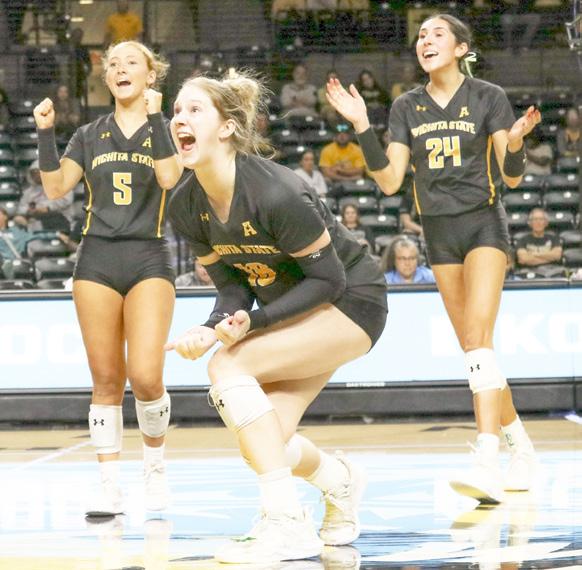
FAU took the first and second sets in controlling fashion. It was the Shockers’ turn to dominate the third set, however, and the fourth set went WSU’s way after the team faced an early 10-4 deficit. In the final set, Wichita State took its first lead of the frame on the final point, winning the final four points to pull off the comeback victory. Gonzales lead the team with 19 total kills, while senior middle blocker Morgan Stout had 15, including six in the fourth set and the final kill of the game. She added four blocks. The Shockers will look for another conference win on Friday, Oct. 18 when they travel to the University of North Carolina at Charlotte. The first serve is scheduled for 5 p.m.
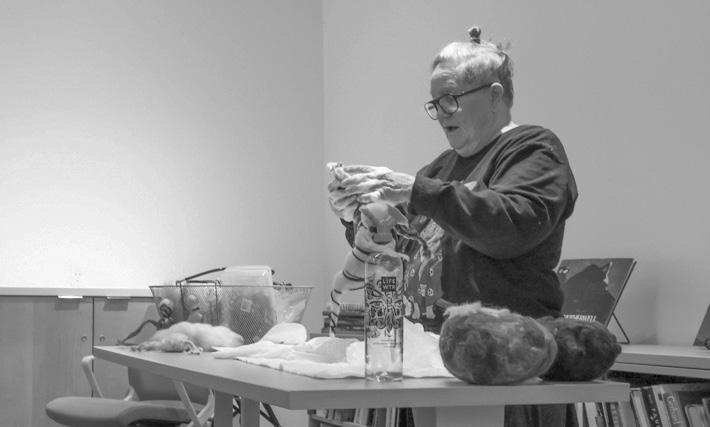
Kind demonstrates what the attendees’ felt pieces should look like. Kind provided a step-by-step demonstration for the participants. |
Participants make their own fiber friends — and find real ones — at felting workshop
BY SOPHIA BEST sophiadapbest@gmail.com
Ernie Kind was only 11 when college recruiters scouted him after seeing his drawings from a comic book he created.
“When they realized I was 11 years old, they went away, and my parents never pursued that,” Kind said.
Decades later, with lifelong art experience under his belt, Kind is a faculty member at WSU’s School of Art, Design and Creative Industries and specializes in fiber arts.
This week’s Senior Wednesday event at the Ulrich Museum of Art was led by Kind and created in conjunction with the Andersen gallery exhibit “[RE]POSE: Leisure Bodies and Empowered Postures.”
There, Kind shared a piece of the world of fiber arts with attendees.
The exhibit, which examines the theme of the reclining figure, replaced the typical nude woman display with a nude felt doll in collaboration with the workshop.
Attendees were led from the to the upper level of the McKnight Art Center to make their own felt figure, assisted by Kind and Ulrich staff.
Kind showed participants how to stretch fiber, wet it with a mixture of dish soap and water to turn it into a human shape, and roll it in plastic — like a roll cake — to get it ready for stuffing.
“Everybody is an artist,” Kind said about the process. “I don’t care whether they deny it or not.”
The event, while intended as a learning experience, drew out connections between some students beyond the surface level.
A group of women sat down together as strangers but quickly found shared beliefs and opinions. They began to talk and laugh as they helped each other with their figures.
“I’m just thrilled to be learning something new,” Stephanie Purdy, one of the women, said. “It’s just really great to be here … with a table of like-minded women.”
Deb McArthur, a long-time Senior Wednesday attendee, noted the importance of holding events that open students up to new artistic experiences.
“Here, we get to make art often, as well as learn or see it out,” McArthur said. “And I think that makes it very special.”

‘The power of typography’ ‘The power of typography’ Typography workshop encourages students to think outside the font
BY MYA SCOTT & MONIQUE BEVER mds.200624@gmail.com
& monibever@gmail.com
Typeface is not something most people think about on a dayto-day basis. For font designers like Dave Crossland, though, that’s all he thinks about.
“(Typography has) been around hundreds of years,” Crossland, a project manager at Google Fonts, said. “It’s been around hundreds of years, and yet in 2024, we’re still coming up with new things to do about it.”
The School of Art, Design and Creative Industries hosted its first typography workshop called MIDPOINT, a two-day event hosted by two guest speakers who are influential in the typography industry. Crossland, MIDPOINT’s first speaker, concluded his first day of workshops with an open lecture that considered “the power of type” through the lens of his work experience.
“I was exposed to these things, global perspectives of this,” Crossland said. “And so I became aware of the power of type, not only for the Latin alphabet, but around the world.”
Crossland’s passion for typography ignited as a student at Ravensbourne University London, where he became interested in designing a typeface.
“And the teacher told me, ‘No, you’re not allowed to design your own typeface at school’ because they didn’t have any experience teaching it,” Crossland said. “It was fair enough, but it made me keen to learn these secrets.”
Crossland pulled examples from all over to show how Baskin Robbins had the same typeface in India and in America, emphasizing his goal to increase the frequency of originality in typography.
The majority of his lecture, though, was the science behind creating fonts. Crossland showed off many different fonts that used the science of optical illusions and math to create different effects.
“You set up some kind of rules about your typography to determine exactly which type to use to get the type of graphic out,” Crossland said. “You set up some constraints, some conditions, and then you let the computer decide what value to pick based on these conditions.”
Crossland explains how having a rhythm to your typeface is important.
“We’re looking at how the type already occurs,” Crossland said. “And so a big concept is (that) typeface is not individually beautiful letters. It’s the collection itself, which is a beautiful thing. This has got a real impact of how typeface changes your experience reading.”
This still is a very ongoing process for me where I’m working closely with these letters, and I’m learning, and I’m sharing what I’m discovering.
Shani Avni, who works on Hebrew typeface, hosted a few different workshops at Midpoint. Avni serves as the Ismar David visiting assistant curator at the Cary Graphic Arts Collection in New York.
On the event's second day, Avni gave a comprehensive presentation on Hebrew type, encapsulating its historical developments and complexities compared to Latin script.
"This still is a very ongoing process for me where I'm working closely with these letters, and I'm learning, and I'm sharing what I'm discovering. And I just have to say that my favorite way to share these letters with students and with whoever is interested is through workshops."
In 2014, Avni acquired a large and rare collection of Hebrew wood type that she's working to grow and share, as well as the workshops and presentations, by uploading them online in a free and accessible manner.
"These are industrial artifacts that are meant to be touched and used and get dirty, and we are trying to do as much as we can, as much workshops and sessions as we can,” Avni said.
Senior Gloria Esparza said she attended because she found typography that wasn’t Latin script interesting.
“I think acknowledging other parts of the world language is important, so it’s interesting to learn something different,” Esparza said.
Attendees were also able to create a project using Hebrew types.
“I’m hoping to get into graphic design and maybe that this workshop would help me understand more about graphic design and what other niches are in it,” sophomore Serena Chau said. “I hope there’s more workshops in WSU. I feel like we don’t really have that many workshops here.”
Crossland encouraged young graphic designers to continue with their work.
“This is a big opportunity for students; the next generation of typography, ” Crossland said. “Typeface design is a tiny niche within a niche within a niche. Type design is this tiny, tiny, thing, yet the people who make type have this enormous influence because text is so big to us.”
Another Broken Egg Cafe has Southern-inspired ‘comfort’ foods that fail to comfort
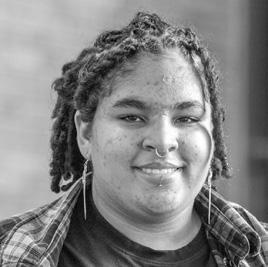
Maleah Evans
maleah.evans04@gmail.com REVIEW
Upscale brunch restaurant
Another Broken Egg Cafe, a franchise location operated by two Wichita State alumni, has a menu that sounds fantastic in theory but in practice is hit or miss.
The restaurant currently offers a fall menu, with specialized drinks and food. They have a pumpkin waffle, tiramisu French toast and a maple spice cold brew.
Their regular menu draws a lot of inspiration from quintessential Southern foods, which sounds absolutely delicious.
Some of their takes on Southern classics include chicken and waffles, shrimp and grits, and biscuits and gravy. They also offer brunch jambalaya and Louisiana gumbo.
One proponent of Another Broken Egg is the big-tent energy it exudes — from on-themenu mocktails to dietary
inclusivity — it’s clear this cafe is approachable for many palettes.
Broken Egg offers a gluten-free menu and a vegetarian menu, and both of them are fairly extensive — a nice addition for those who usually are deprived of an ample menu. The restaurant probably has you covered, as it offers many options for those with dietary restrictions that a lot of restaurants don’t have.
For drinks, they have a large list of handcrafted cocktails, as well as mocktails for those who don’t, or can’t, drink, and even spiked coffees, which can also be made with non-alcoholic spirits.
I focused on their breakfast menu when I ordered, which may have been my first mistake. I think that I would like their lunch-focused items more than the breakfast options.
I had the Bacquezo omelette, which was filled with bacon and cream cheese, topped with sautéed chorizo, cheddar jack cheese and green onions. It came with an English muffin and country potatoes. I also tried their classic
buttermilk pancakes, which come with two eggs and a choice of bacon, sausage patties, andouille sausage, maple apple chicken sausage or ham.
I could not finish the omelet; it was too greasy and the eggs tasted like cardboard. I ended up scraping off the chorizo and dipping the potatoes into it.
The potatoes were honestly the best part, and even then, they were underwhelming. They lacked good seasoning, but mixing them with the chorizo made them more tolerable.
The pancakes were OK; they were edible but nothing to rave about. Some of their more dressed-up pancakes could be better, but the plain ones didn’t taste much different from the boxed pancake mix that I can get at Walmart.
After a first taste of the breakfast options, I probably wouldn’t give them another chance, especially with the prices.
As a college student, I try to be mindful of prices and Another Broken Egg Cafe is a little too much for me. The cheapest item

